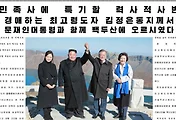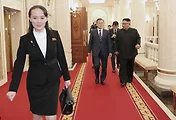인간의 최고 가치인 '자유', 스스로 생각하고 스스로 결심해서 스스로 행동하고 스스로 평가할 수 있는 능력이 바로 자유이다.
이런 자유 뜻이 국가 간에도 적용될 수 있는가? 예, 아니오, 그렇기도 하고 아니기도 하다냐?
남북한이 트럼프에게 노벨 평화상을 기꺼이 양보한다고 해도, 미국을 대표하는 트럼프 속내는 '우리가 주인이고, 너희들은 우리의 승인을 받아야 하는 아직 독립적이지 못한 2류치들이다.'
인류사의 지혜라고 할 수 있는 '대화와 외교'는 중요하기 때문에, 인내를 가지고 목표를 달성할 때까지 트럼프, 중,러,일과 외교를 해서, 이 어이없는 냉전구조를 남북한에서 깨부셔야 한다.
하지만 잊지 말아야 할 것은, 다시는 이런 상황이 도래하지 않도록 만들어야 한다.
Asked about reports South Korea was considering lifting some sanctions against North Korea, Trump said: “They won’t do it without our approval. They do nothing without our approval.”
미국과 UN 의 북한에 대한 '제재' 조치들 중에서, 남북한 교류 부분에 대해서 그 제재조치를 완화시켜야 한다는 여론이 남과 북에서 일어나고 있다.
이에 대한 트럼프의 발언은 "미국의 승인없이 남북한이 북한에 대한 경제제재 해제를 하지 못할 것이다. 미국의 승인없이는 어떠한 행동개시도 못한다."
인간의 자유가 너무 당연한 것도 아니고, 그저 주어지지 않는다.
approve 사전적 의미 (승인, 재가, 허가)
to give official agreement or permission to something
(공식적으로 동의하다, 혹은 허가하다)
This year’s budget package has been formally approved by parliament.
The new stamps were personally approved by the Queen.
be approved for something: These chemicals were only approved for use in animal foods.
일상 대화: 부모가 어린 자녀들의 행동, 결정에 대해서 '승인'해주다.
to have a positive feeling towards someone or something that you consider to be good or suitable
OCTOBER 10, 2018 / 10:04 PM / UPDATED 4 HOURS AGO
Trump says South Korea will not lift North Korea sanctions without U.S. approval
David Brunnstrom, Joyce Lee
SEOUL/WASHINGTON (Reuters) - U.S. President Donald Trump said on Wednesday South Korea will not lift sanctions on Pyongyang without U.S. approval, after the South Korean foreign minister softened earlier comments that some of its unilateral sanctions were under review.
South Korean President Moon Jae-in and North Korean leader Kim Jong Un walk during a luncheon, in this photo released by North Korea's Korean Central News Agency (KCNA) on September 21, 2018. KCNA via REUTERS/File Photo
Trump’s rejection of South Korea easing sanctions alone outlines the official position of the United States and South Korea that the two countries remain in lockstep on North Korea.
He has encouraged U.S. allies to maintain sanctions on North Korea until it denuclearizes as part of his administration’s “maximum pressure” campaign against Pyongyang.
Asked about reports South Korea was considering lifting some sanctions against North Korea, Trump said: “They won’t do it without our approval. They do nothing without our approval.”
South Korean foreign minister Kang Kyung-wha suggested during a parliamentary audit on Wednesday that Seoul was considering easing its own sanctions against the North to encourage its denuclearization.
U.S. President Donald Trump holds a campaign rally in Erie, Pennsylvania, U.S., October 10, 2018. REUTERS/Leah Millis
South Korea imposed unilateral sanctions on the North in 2010 following an attack on a warship that killed 46 South Korean sailors, banning most bilateral trade and exchanges.
Kang later walked back her comments after they sparked criticism from some conservative lawmakers, claiming North Korea should first apologize for the attack.
The South Korean foreign ministry also officially denied that the government was reviewing the matter.
However, there are growing calls for easing sanctions.
China, Russia and North Korea believe it is necessary to consider adjusting U.N. sanctions against Pyongyang at an appropriate time, China’s foreign ministry said on Wednesday.
In a rare confirmation of discord between Seoul and Washington, South Korea’s Kang also said on Wednesday U.S. Secretary of State Mike Pompeo had expressed “discontent” with an inter-Korean military pact reached during a summit last month.
VERBATIM: Trump spoke to top Saudis on missing journalist
She said there were views in the United States regarding “adjusting the pace” of inter-Korean moves.
The drive for denuclearization sprang from pledges made by Trump and North Korean leader Kim Jong Un at their historic summit in Singapore in June, although there has since been disagreement over how that would be achieved.
(The story is refiled to reflect 46 sailors killed in paragraph six.)
Reporting by David Brunnstrom in WASHINGTON and Joyce Lee in SEOUL; Editing by Ju-min Park and Paul Tait
Our Standards:The Thomson Reuters Trust Principles.
WORLD NEWSOCTOBER 10, 2018 / 11:30 AM / UPDATED 14 HOURS AGO
South Korea says Pompeo complained about inter-Korean military pact
Hyonhee Shin
4 MIN READ
SEOUL (Reuters) - U.S. Secretary of State Mike Pompeo has expressed “discontent” with an inter-Korean military pact reached during last month’s summit, South Korea’s foreign minister said on Wednesday, in a rare disclosure of signs of disagreement with its U.S. ally.
FILE PHOTO: U.S. Secretary of State Mike Pompeo speaks with South Korean Foreign Minister Kang Kyung-wha at the presidential Blue House in Seoul, South Korea, October 7, 2018. Ahn Young-joon/Pool via REUTERS/File Photo
The two Koreas agreed to halt military drills, set up a no-fly zone near the border and gradually remove landmines and guard posts within the Demilitarised Zone, among other steps.
The deal was sealed by South Korean President Moon Jae-in and North Korean leader Kim Jong Un during their third summit in Pyongyang on Sept. 18-20.
During an annual parliamentary audit on Wednesday, an opposition party lawmaker asked Foreign Minister Kang Kyung-wha if Pompeo had complained about the agreement during a phone call reported earlier by Japan’s Nikkei newspaper.
“Yes, that’s correct,” Kang said in response. “I wouldn’t say he made strong expressions. (It was) discontent, about how he was not briefed sufficiently, and he had a lot of questions within my knowledge.”
Her remarks amounted to a rare confirmation of discord between Seoul and Washington, amid U.S. concerns that inter-Korean relations may be warming too fast relative to negotiations to dismantle North Korea’s nuclear arms program.
While maintaining that it remains in lockstep with the United States, South Korea has forged ahead with efforts to engage with North Korea, even as critics accused Moon of naively focusing on feel-good theatrics at the expense of real progress in persuading North Korea to give up its nuclear weapons.
Kim vowed to work toward denuclearization during his unprecedented June summit with U.S. President Donald Trump. But Pyongyang’s actions have since fallen short of U.S. demands for irreversible steps to scrap its arsenal, including a full disclosure of nuclear facilities and materials.
When asked by a South Korean ruling party lawmaker whether Washington felt the South was pushing ahead too rapidly with its reconciliation policy toward the North, Kang cited views regarding “adjusting the pace” of inter-Korean moves.
“I don’t think the military agreement would bring significant changes in terms of readiness or operations, but they (U.S.) could complain we made far more concessions than the North did, especially ahead of the second North Korea-U.S. summit,” a South Korean military source told Reuters, asking for anonymity due to the sensitivity of the matter.
“The U.S. could prefer a reciprocal approach where each side makes a concession step by step, rather than a comprehensive bargain as we did.”
Kang and Pompeo spoke by phone on Sept. 17, a day before the three-day inter-Korean summit kicked off and shortly after Seoul informed Washington of the military accord, a diplomatic source told Reuters.
The Pyongyang summit was in part designed to help revive nuclear talks between the North and the United States, which were on shaky ground after Trump canceled Pompeo’s visit to the North in late August, citing a lack of progress.
Reporting by Hyonhee Shin; Editing by Mark Heinrich
Our Standards:The Thomson Reuters Trust Principles.
'한국정치 > 북한_DPRK' 카테고리의 다른 글
| 남북 철도 연결 It is a very good start to make two Koreas live peacefully together. (0) | 2018.11.26 |
|---|---|
| 북한 자료, 장마당 세대 the Jangmadang Generation (0) | 2018.11.19 |
| Tim Shorrock ; How ‘The New York Times’ Deceived the Public on North Korea (0) | 2018.11.17 |
| 김정은 문재인 백두산 등반 - 특기할 력사적 사변 (로동신문 보도 자료) (0) | 2018.09.22 |
| 김여정 출산 - 박지원 전언 (0) | 2018.09.21 |
| 도널드 트럼프는 북한과 협상하기 위해 제 2차 북미 정상 회담 개최할 가능성이 크다. (0) | 2018.09.20 |
| 김정은 문재인 백두산 공동 등반, 천지 가는 길 전송사진 (0) | 2018.09.20 |



